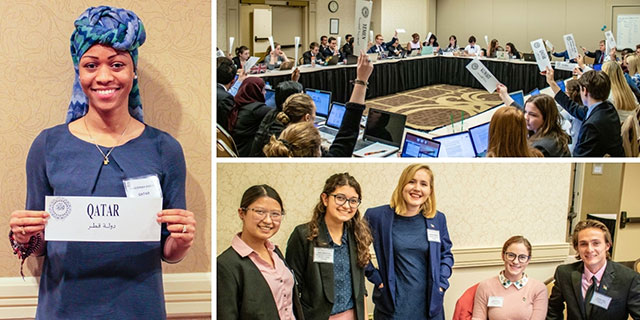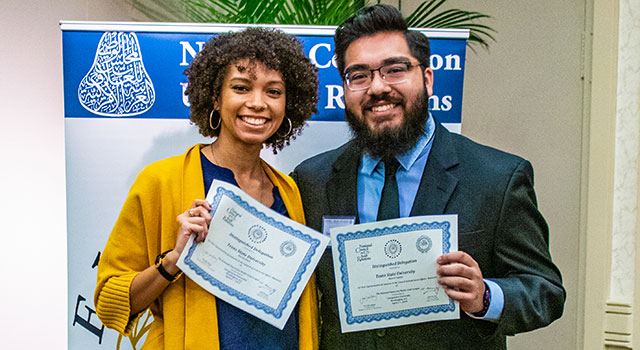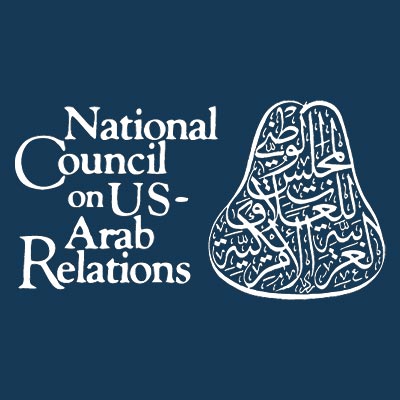Dr. Hamad Al Muftah to Speak at Annual National University Model Arab League Forum

Washington, D.C., U.S.A.: During the final weekend in March, the National Council on U.S.-Arab Relations (“National Council” / “Council”) will host the Deputy Chief of Mission from the Embassy of the State of Qatar. Dr. Hamad Al Muftah will address the Council’s forthcoming 38th Annual National Youth Leadership Development / Model Arab League Conference. He will make remarks to the Council’s student-led forum virtually as it convenes online at the National-level for the first time. The Embassy of the State of Qatar is the exclusive sponsor of the 2021 National Youth Leadership Development / Model Arab League Conference.
Background and Context
Each school year, the National Council convenes as many as 25 different Youth Leadership Development Program / Model Arab League conferences. The forums are held in more than 20 cities throughout the United States, reaching a large and diverse collection of future American and Arab leaders.
Since its establishment 38 years ago, the National Council’s Youth Leadership Development Program has produced over 50,000 alumni. Many of the former participants now serve as elected and appointed leaders, prominent diplomats, national security analysts, commanders in the United States and other countries’ armed forces, international media correspondents, international business executives, and a broad range of other roles and positions where they work to sustain and deepen the Arab-U.S. relationship.
The Embassy of Qatar in Washington, D.C.’s, Deputy Chief of Mission will address the National Council’s National University Model Arab League conference. He will do so online due to public health considerations resulting from the COVID-19 pandemic. Nearly 400 students from as many as 25 universities will be in attendance.
In announcing Dr. Hamad Al Muftah’s participation, National Council President Dr. John Duke Anthony said, “The Council is delighted to welcome such a distinguished foreign affairs specialist to its flagship Youth Leadership Development / Model Arab League Conference. For the students who are role-playing as diplomats representing different Arab countries for this educational exercise, having the opportunity to hear from a leader like Dr. Hamad Al Muftah is a special learning opportunity. The Council thanks him for his willingness to share his insights and analyses with the students and faculty members taking part in the conference. The Council is also grateful to the Embassy of Qatar for supporting this cross-cultural, educational, and leadership development endeavor.”
Dr. Hamad Al Muftah assumed his duties as Deputy Chief of Mission at the Embassy of Qatar in the United States in September 2018. He was previously Deputy Chief of Mission at the Embassy of Qatar in London, United Kingdom, from 2013-2018. Prior to his time in London, he held the position of Deputy Consul General at the Consulate General of Qatar in Houston, TX, from 2010-2013.

Leadership Skills Taught and Practiced
The skills taught and practiced in the National Council’s Youth Leadership Development Program are ones that are used in real-life situations. Students are introduced to and provided opportunities to demonstrate nine different leadership skills. Each is designed to help the participant in practically any career they might choose.
Three of the leadership skills that the program teaches and allows the students to practice are how to speak, write, and edit quickly and effectively – importantly, in each case within tight deadlines. For many, doing so in accordance with having less time available than one would prefer is very difficult. Yet, with practice, these abilities can be improved to the point where students find the challenge to be minimized.
The fourth and fifth skills that these National Council leadership sessions teach are how to debate effectively and do so utilizing parliamentary procedure. For example, in most large formal meetings it is improper for someone to interrupt someone else just to say, “Hey, I agree with that.” Instead, there are basic procedures that help everyone consider different viewpoints, and make decisions in a fair, consistent, and effective manner. Most students are amazed at how little time it takes to learn and practice such skills through the Council’s Youth Leadership Development Program.
The sixth leadership skill that the National Council helps students develop is how to draft a resolution in support of their position or recommendation. As the goal is to persuade others to adopt ones point of view, the choice and sequence of words is important. This ability helps the participants practice to organize their thoughts in a logical and effective manner.
The seventh, eighth, and ninth skills have to do with the students learning how to work with others to achieve common goals. Participants realize that the art of persuading others to support their positions is at times difficult and can require considerable effort. Through this Council educational program, students are able to practice cultivating respect among their peers and organizing coalitions. They deepen their ability to empathize with others’ needs, interests, and concerns. The students thereby learn and practice how they are more likely to accomplish their objectives if they proceed in a cooperative manner with their colleagues rather than by trying to reach all of their goals by acting alone.
Throughout the process of learning and practicing these nine skills, the students deepen their information and insights, and broaden their horizons. They enhance, strengthen, and expand their understanding about the 22 Arab nations that comprise one of the planet’s most vitally important areas, and the world’s relationships with these countries and vice versa.
Involvement in National Council’s Youth Leadership Development Program could hardly be more essential. Few programs are as effective in introducing and exploring the complexities facing our global community. Just imagine what happens as students analyze and address issues from a perspective different than their own. Not only do they dramatically improve their ability to think critically and empathetically, they also enhance their ability to address the multifaceted range of challenges facing humanity’s shared future.
About the National Council on U.S.-Arab Relations: Founded in 1983 and based in Washington, D.C., U.S.A., the National Council is an American non-profit, non-governmental, educational organization dedicated to improving American knowledge and understanding of the Arab region. Information about the Council’s program, projects, events, and activities can be found at ncusar.org.


